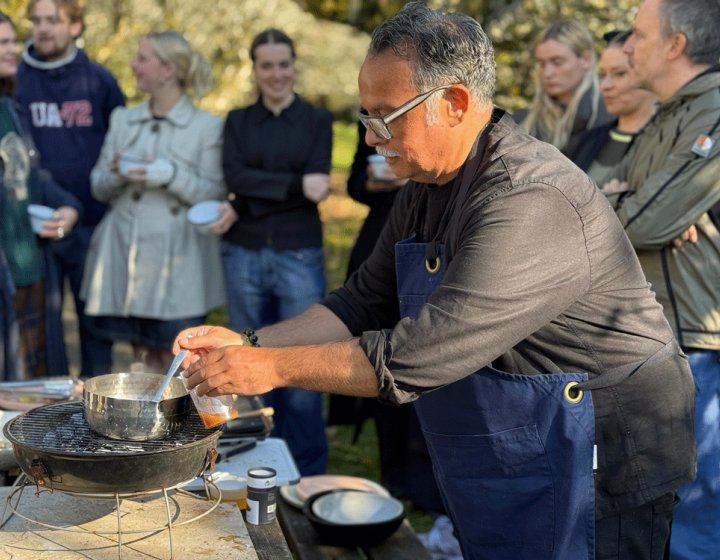Simon Nicholls offers expert insight into his MA Comedy Writing course
26 October 2021

The multi-award-winning TV and audio comedy producer is bringing a wealth of experience and skills to Falmouth’s new online MA.
Simon Nicholls has been obsessed with comedy and making people laugh from a young age. His imagination was first captured by BBC 2 repeats of Monty Python’s Flying Circus, and he’s been hooked ever since.
“I thought it was completely insane and funny”, Simon tells us. “I even got the Monty Python script books – I used to read out the Spanish Inquisition sketch and do all the voices! What a nerd! I was really into anything off the wall and silly. Naturally, I’m quite a stupid human being.”
Simon’s dedication to his craft continued throughout school; being thrown out of a French lesson in a record 1.3 seconds, cracking jokes to avoid being beaten up by class bullies and writing a sketch show that cancelled his school’s assembly were all early career highlights.
As the comedy writing lead reflects, “I just had this mischievous streak as a kid – but I’m not remotely like that anymore, I’ve calmed down now.”
Tough love and big breaks
Despite knowing exactly what he wanted to do from the age of 13, Simon was pushed into studying a law degree by his family. “My grandmother told me that ‘if comedy doesn’t work out, at least you can write people’s wills.’ That’s not even the case! Within two weeks of my degree, I knew I hated it.”
Although Simon’s grandmother was the reason he’d been consigned to three years of totally irrelevant study, the same woman helped him break into the comedy world. “After my degree, I was living at my Gran’s. I’d responded to an ad in the paper for a position as a runner on Jonathan Ross’ new panel show, and when the producers called up, she picked up the phone. She told them what a wonderful young man I was, and they found her so funny that they agreed to meet me! It ended up being my first job in comedy.”
And the reason he was hired for that position?
“In the words of the producers who hired me: ‘because I looked like a weirdo!’ But I think they were also intrigued by me, because they saw I had the law degree and just couldn’t understand why I would earn peanuts to be a runner instead of making money as a lawyer. But it was just what I wanted to do.”
Lessons for new comedy writers
Twenty years later, Simon’s decision has proved to be a good one. His multiple awards for work on Ed Reardon’s Week and Chris Addison's The Ape That Got Lucky, as well as production credits on an array of BBC television and radio shows speak for themselves.
While he’s still an active producer, Simon’s focus has now shifted to creating and leading the MA Online Comedy Writing course at Falmouth. Joking that he started the MA so that new comedy writers “could have a bit of practice before approaching [him] with their ideas”, Simon has seen plenty of new writers fall at the first hurdle when it comes to attracting the interest of a producer. His industry experience makes him a perfect sounding board for writers who don’t know how to take their first steps into the comedy world.
“One of our modules is entirely focussed on the industry and how to navigate it. I think what makes this course bespoke is that it teaches you how to sell your ideas and promote yourself as a writer.
“How to approach and meet an agent, how to approach a producer, how to make things happen for yourself… we cover it all, in addition to teaching you the creative skills to write strong comedy. I think it’s so important. I don’t see why you’d bother teaching someone all the creative stuff but not tell them how to bring it to life.”
Calling on industry experience
And Simon believes working as a producer was the perfect training for his new role as course leader. “The way I see it, running this Comedy Writing course requires the same skills. As a producer, what I’m doing is spotting new writers with talent, developing their skills and enabling them to sell their idea.”
“In the same way, applicants will send me a sample script, I’ll read it, and if I see potential in the writer, I’ll ask them to join the MA. I then teach them everything I know about writing comedy, with a view to building up their confidence and giving them the skills to approach the industry.”
According to Simon, building up confidence by providing a clear roadmap when it comes to comedy writing is an important part of the process. As Simon explains, “the way I teach scriptwriting is a bit like building a huge Lego kit. It’s done in a manageable way, piece by piece. It’s very easy to mess up a comedy script, so you’ve got to plan it carefully.
“Comedy, whether it’s a sketch, sitcom or comedy drama, needs to have everything drama has – a juicy plot, a dramatic story, an emotional story… AND it has be funny. This is why a lot of professional writers will tell you that comedy is harder to write than drama. Then add to this the fact that everyone has a different sense of humour, and you have quite a challenge on your hands!”
Comedy allies
Luckily, Simon’s professional experience means that he can call on some old friends to lend a helping hand. On the MA there are a growing number of recorded masterclasses that students can access with comedy supremos including the likes of Bafta and Emmy-winning comedy writer Simon Blackwell, Bafta-winning French and Saunders, Emmy-winning Paul Mayhew-Archer and former head of BBC and Sky Comedy Commissioning Lucy Lumsden. In fact, Simon is the producer of Falmouth Vice-Chancellor Dawn French and Jennifer Saunders’ award-winning comedy podcast French & Saunders: Titting About.
“I recorded a masterclass with Dawn and Jennifer, which is part of the MA. Dawn is incredibly supportive of the course and happy to help if she can.”
Rather than allow the conversation to home in on the Queen of Falmouth University, Simon is keen to point out what students can hope to achieve after graduating from his course.
“There are so many opportunities for comedy writers at the moment. You have the rise of streaming platforms commissioning new comedies, as well as the traditional routes of audio comedy (podcasts and radio), social media, television and film.
If someone writes a script that I think has a shot at being produced, I’ll be more than happy to put it forward.
“The course will teach you how to write good comedy, but it will also teach you how to collaborate, how to work methodically, how to make a serious point and make someone laugh at the same time, how to meet deadlines and how to navigate the industry. These are all important tools for a successful career.
“I also make the point of reminding my students that I’m still an active producer – if someone writes a script that I think has a shot at being produced, I’ll be more than happy to put it forward.
“But beyond that, writing something that makes people laugh is such a joyous thing to do. If you can make someone laugh, that’s a wonderful thing – why wouldn’t you want to do that?”




